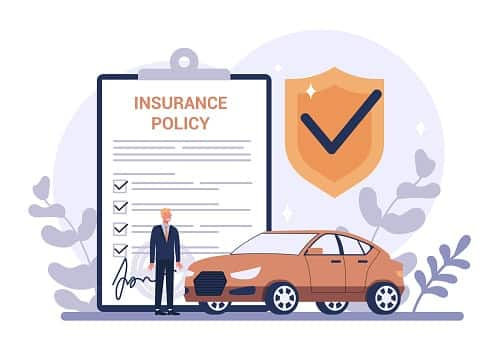Finding the best mechanical breakdown insurance
Mechanical breakdown insurance is sold through several different sources:
- Car insurance companies
- Car dealers
- Financial institutions that handle car financing, such as banks or credit unions
 Just like an extended car warranty, these policies do not cover normal maintenance and wear-and-tear on your car. However, mechanical breakdown insurance can add a layer of protection on top of a warranty or help cover costs after your warranty expires. You can purchase various levels of repair coverage for a certain number of miles or months.
Just like an extended car warranty, these policies do not cover normal maintenance and wear-and-tear on your car. However, mechanical breakdown insurance can add a layer of protection on top of a warranty or help cover costs after your warranty expires. You can purchase various levels of repair coverage for a certain number of miles or months.
For example, a minimum level of coverage might apply to repairs, such as:
- Transmission and transaxle cases and their internal components
- Engine parts, such as the oil pump, pistons, timing gears, flywheel and valves
- Drive axle housings and internal components, axles and joints
As you increase your level of coverage, you can add electrical, cooling, steering, air conditioning and fuel system repairs.
Most mechanical breakdown insurance policies also cover costs associated with breakdowns, such as towing and rental car coverage. What's more, they may come with added benefits, including 24-hour roadside assistance and lock-out service.
Consider these six factors before buying a mechanical repair plan:
- Deductible (i.e. out-of-pocket cost before coverage begins)
- Maximum coverage limits
- Vehicle mileage limits
- Limitations on which repair facility you can use
- Any exclusions
- Whether the plan duplicates services you already have through a car warranty or roadside assistance plan
Mechanical breakdown insurance cost
 On a new or nearly new car, mechanical breakdown coverage through your car insurance company might cost as little as $40 to $50 a year. The older the car and the higher the mileage, the costlier the breakdown policy--especially when the car is no longer backed by the factory warranty.
On a new or nearly new car, mechanical breakdown coverage through your car insurance company might cost as little as $40 to $50 a year. The older the car and the higher the mileage, the costlier the breakdown policy--especially when the car is no longer backed by the factory warranty.
But most of these plans won't do much for a buyer until the factory warranty expires, and even then there's a deductible or co-pay.
Insurers vary greatly in their terms for breakdown coverage. Geico, for example, offers mechanical breakdown coverage only for cars less than a year old with less than 15,000 miles. Other carriers may write coverage on cars, new or preowned, as old as seven or eight years, with as many as 100,000 miles.
David Scott, vice president of Mercury Insurance’s mechanical breakdown division in Oklahoma City, says the insurance cost is based on your type of vehicle, the contract's length and number of miles covered, and the level of protection you choose. It can run anywhere from hundreds of dollars to thousands. Mercury offers four levels of mechanical breakdown insurance, from a basic bronze level of powertrain coverage to a platinum level that covers everything except items specifically excluded (such as normal wear-and-tear items like brakes, tires, shocks and wiper blades).
Mercury offers four levels of mechanical breakdown insurance, from a basic bronze level of powertrain coverage to a platinum level that covers everything except items specifically excluded (such as normal wear-and-tear items like brakes, tires, shocks and wiper blades).
Perks of a Mercury mechanical breakdown plan include:
· Rental Vehicle Assistance
· Tire Protection
· Trip Interruption Coverage
· Nationwide Protection
· Repairs can be done at any licensed U.S. repair facility–you choose where to take your vehicle
· There is no limit to the number of claims you can make
"Another benefit of our coverage is that you can transfer it to the buyer of your car," says Scott, who adds that offering to transfer the service contract may make the car more attractive to potential buyers.
How does an extended car warranty work?
Most new cars and even some used cars come with a warranty. These plans protect against mechanical defects and pay for repairs to the transmission, engine, brakes and other systems. The downside is once a certain period of time has passed or a certain number of miles have been driven, the auto warranty expires. Once that happens, consumers have to pay for repairs out of pocket unless they have an extended car warranty or mechanical breakdown insurance.
Extended warranties may be sold by a dealership or other third party, and many auto manufacturers also offer their own extended warranty plans. The details differ by plan, but the chart below is an example of the type of warranties and level of coverage you might find.
Example warranty coverages
| Warranty | Basic | Mid-Level | Premium* |
|---|---|---|---|
| Air conditioning | X | ||
| Braking | X | ||
| Drive Axle | X | X | X |
| Electrical | X | X | |
| Engine | X | X | X |
| Steering | X | ||
| Suspension | X | ||
| Transmission | X | X | X |
*Sometimes called “Bumper-to-Bumper”
The best extended auto warranty might last for seven years while those with less coverage might run for periods of 2, 3 or 5 years. Price varies depending on the year and vehicle model as well as the level of coverage.
While these plans might make sense in some situations, mechanical breakdown insurance may be cheaper and easier to cancel. With an extended car warranty, you often pay the entire cost upfront and may not be able to get a refund if you cancel. However, mechanical breakdown insurance may be billed on a monthly, quarterly or annual basis and canceled at any time.
And of course, it's important to be wary of scams. Recent years have seen so many robo-calls related to "your car's extended warranty" that it's become fodder for jokes and memes. Make sure you work with a reputable company as scams are everywhere.
What is a vehicle service contract?
 Since most mechanical breakdown insurance policies don't include vehicle maintenance, such as oil changes or tune ups, consumers may be looking for a way to cheaply pay for those items. One option is to buy a vehicle service contract. Auto dealers may sell vehicle service contacts, which essentially allow customers to pre-pay for services at a discounted rate.
Since most mechanical breakdown insurance policies don't include vehicle maintenance, such as oil changes or tune ups, consumers may be looking for a way to cheaply pay for those items. One option is to buy a vehicle service contract. Auto dealers may sell vehicle service contacts, which essentially allow customers to pre-pay for services at a discounted rate.
If you want to save on a vehicle service contract, you may have the most negotiating power at the time you purchase your car. Dealers eager to close a sale may be willing to throw in a contract at a greatly reduced rate. However, be aware that most vehicle service contracts require you to use a specific service center or dealership so be sure that location is convenient for you.
What does roadside assistance cover?
Roadside assistance usually provides a 24/7 hotline for members to call in the event of a vehicle breakdown. A representative assesses the situation, and then arranges for the appropriate assistance. For example, if your car has gone into the ditch, a tow truck may be dispatched to your location, or in the event of an accident, the police may be notified on your behalf.
These plans may be sold as add-ons to auto insurance policies or offered as a perk to members of groups, such as AAA, or as a benefit with certain credit cards. When purchased in this way, the cost of roadside assistance may be equal to only a few dollars a month.
If you only have roadside assistance through your insurance company or a member organization, the plan may pay for some or all of the cost of towing. However, it is unlikely to pay for any mechanical repairs. For that, you'll need mechanical breakdown insurance. Fortunately, most mechanical breakdown policies include roadside assistance so you can get both services for one price.
Is mechanical breakdown insurance worth it?
Again, that's a decision every car owner must make for him or herself. But the following two things are clear:
- Mechanical breakdown insurance can be cheaper and more convenient than an extended car warranty.
- Mechanical breakdown insurance is more comprehensive than roadside assistance alone.
You may want to consider mechanical breakdown insurance if you have difficulty paying for repairs or have purchased a used car and think regular repairs may be necessary.
It's free and easy to compare quotes. Contact a few companies to get prices for your vehicles and then decide if the money is worth the peace of mind.
Additional reporting by Maryalene LaPonsie






